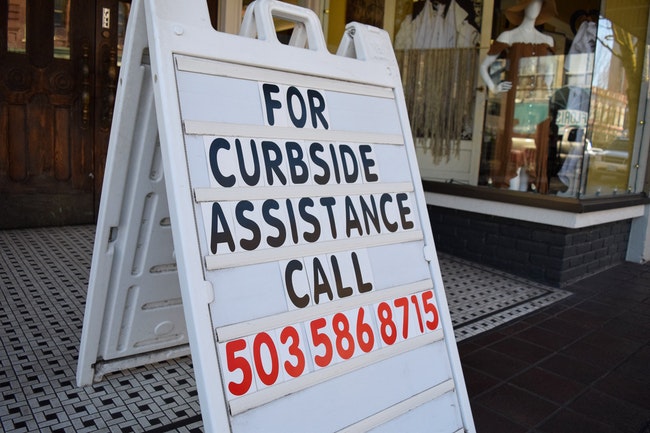 Many restaurants in Salem were offering takeout orders after a ban on dining in at eateries went into effect on Tuesday, March 17. (Saphara Harrell/Salem Reporter)
Many restaurants in Salem were offering takeout orders after a ban on dining in at eateries went into effect on Tuesday, March 17. (Saphara Harrell/Salem Reporter)
Oregon restaurants and bars can provide only takeout service, gyms and other fitness outlets must close and grocers and retailers have to limit the number of customers inside at any point under sweeping new restrictions Gov. Kate Brown issued Friday to curb the rapid spread of the coronavirus.
The rules, which Brown dubbed a “two-week freeze,” will be in effect Wednesday, Nov. 18, through Wednesday, Dec. 2 and come as Oregon is shattering daily records of new Covid cases statewide, with more people hospitalized with Covid than at any time since the pandemic began.
Marion County has recorded 656 cases of the virus in the past week, 9% of its total cases since the pandemic began.
Statewide, 303 Oregonians are hospitalized with Covid, up from 217 just one week ago, and some Portland-area hospitals are now limiting elective surgery to keep beds available for critically ill patients.. Salem Hospital has not yet taken that step.
Under the new mandate, Oregonians must limit social gatherings, whether indoors or outdoors, to no more than six people total from no more than two households. That rule will be in effect for the Thanksgiving holiday and comes after weeks of health authorities urging people to cancel plans for large family celebrations.
Venues that host or facilitate indoor events must close, as well as indoor and outdoor recreational facilities.
Grocery stores, pharmacies, retail stores and malls can remain open but are limited to 75% capacity and should encourage curbside pick-up, Brown said.
Faith-based organizations and religious services can have no more than 25 people indoors or 50 people outdoors.
The move will clearly have an impact on the Salem-area economy. Restaurants already reported they were paring staffing under rules announced just last week that put Marion County in a “pause” for two weeks.
Those restrictions had limited restaurant capacity to 50, including staff, and allowed parties of no more than six to be seated together.
Since the governor began reopening Oregon’s economy in the spring, the state’s leisure and hospitality industry has begun recovering and adding back jobs. But the reopening has come with social distancing and sanitation requirements and some restaurants have closed after seeing a drop in customers.
The Oregon Restaurant and Lodging Association has complained that the limits on capacity are arbitrary when restaurants have largely followed Covid protocols and the rise in transmissions has been blamed on private gatherings.
Statewide, few cases of Covid have been traced back to restaurants, but a growing share of cases in Oregon can’t be traced back to a known source, and state health officials have said contact tracing resources are stretched thin.
And the closures and possible layoffs come as Congress and President Donald Trump show no sign of reaching a deal to continue the massive levels of federal support credited with helping keep Oregon’s economy afloat in recent months.
A consortium of businesses and business associations from across the state calling itself the Coronavirus Recovery Business Coalition responded to the new restrictions with a letter asking the governor to change course.
The letter said that businesses have diligently followed Covid regulations and workplaces closed during the pandemic accounted for less than one-half of 1% of cases. The letter further said that the state’s response should focus on stopping the spread of Covid at social gatherings, which have been blamed on the recent surge.
The coalition asked Brown to hold off on any additional closures or curtailment of business operations. Instead, the coalition said Brown should bolster rapid testing and contact tracing while assembling panels focused on community spread and the distribution of an expected vaccine. It also said the governor should implement a public information campaign.
“Like many Oregonians, we are also concerned about the significant uptick in positive COVID-19 cases of the past few weeks,” said Sandra McDonough, president and CEO of Oregon Business and Industry, in a statement. “We are committed to engaging and working with the governor to implement the actions that need to be taken to slow the spread of this dangerous virus, while safely keeping open the doors of the businesses that feed our families, support our communities and keep our economy afloat.”
McDonough said that when the initial stay-home order came in March it was accompanied by federal relief programs to keep workers on the payroll and provide additional support for people out of work. With no additional federal support on its way businesses and families will be struggling just before the holidays, she said.
A number of sectors are unaffected, including personal services like hair salons, which can continue operating under existing rules.
Homeless shelters can remain open, and rules for outdoor recreation aren’t changing.
Schools, child care and youth programs are also unaffected. Colleges and universities, including Division 1 sports, and professional athletic organizations can stay open under existing rules.
Some rules Brown announced last week for counties with the highest rate of new Covid cases now apply statewide. Those include requiring all businesses to mandate working from home as much as possible, and prohibiting indoor visits at long-term care facilities, which continue to be hotspots for outbreaks and Covid-related deaths across Oregon.
Jake Thomas contributed reporting.
Contact reporter Rachel Alexander: [email protected] or 503-575-1241.
SUPPORT ESSENTIAL REPORTING FOR SALEM – A subscription starts at $5 a month for around-the-clock access to stories and email alerts sent directly to you. Your support matters. Go HERE.

Rachel Alexander is Salem Reporter’s managing editor. She joined Salem Reporter when it was founded in 2018 and covers city news, education, nonprofits and a little bit of everything else. She’s been a journalist in Oregon and Washington for a decade. Outside of work, she’s a skater and board member with Salem’s Cherry City Roller Derby and can often be found with her nose buried in a book.









